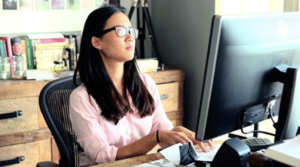Transcript
Hello everyone, I hope you're well.
Today, we're going to talk about television, or rather TV programs. Together we're going to look at 7 series and TV shows that could be of interest to you as you progress in French.
There's something for everyone. If you prefer general knowledge shows, if you prefer funny series or if you prefer dramatic or even spy series, you're bound to find what you're looking for.
Let's start right away with the first series. I'm going to tell you about a series called Fais pas ci, fais pas ça. In English, it's called Desperate Parent. It's one of my favorite series. It's a show that makes me laugh a lot. It's a sort of French Modern Family. In this series, we follow the lives of two families who live next door to each other.
They live next door to each other. These two families have quite different upbringing styles. One family is Catholic, quite conservative, and strict with their children.
🚀 Transform your understanding of French IN 15 MINUTES A DAY
60 dialogues to boost your understanding of French 🇫🇷
And the other family is what we call "bobos" in France. They're much more modern, much more lax in the way they bring up their children. Everything is a bit opposed to them, but at the same time, they're going to meet on different points. First of all, their children are more or less the same age, so they know each other. And we're going to get a glimpse into the lives of these two families and how they live together.
You can find this series on the LingoPie platform. I've already mentioned it several times. It's a streaming platform dedicated to language learning. As I've already told you, I think it's great to be able to learn by watching films, series and TV shows. It's a really fun way to learn.
So I'm going to show you how it works. If I go to Lingopie, I'm going to run this series Don't Do This, Don't Do That. I'm launching the first episode so as not to spoil anything. On the platform, you can find the first three seasons. In all, there are nine.
You can watch with French subtitles, and when there are words you don't understand, you can drag your mouse over them and you'll get the translation in your language. When you click on words you don't understand, they are added to a list of words to review. The site will suggest a game to review these words. You can also use the mashup subtitles feature. So if you're new to French, it's much simpler. The subtitles are in your language, and only certain key words are displayed in French.
The platform offers a seven-day free trial. It's the perfect way to find out if this learning method is right for you, and to get started with the "Fais pas ci, fais pas ça" series. If you then decide to subscribe, the platform offers you -65 % on the annual subscription if you follow the link I put in the description.
The second TV show I want to tell you about is a general culture program. I know it exists in other countries. You may already have heard of it. It's called "Who Wants to be a Millionaire?"
This program no longer exists in France. It's no longer broadcast on television. It used to be on TF1, but you can find it on YouTube, so on the YouTube of "Who Wants to Be a Millionaire", I'll put it in the description.
You can watch entire programs or parts of programs. I've seen that there are 20 minutes or 45 minutes of shows. Why do I think it's a good idea to watch "Qui veut gagner des millions" to improve your French?
Candidates will be asked a series of questions, about fifteen of which will remain on the screen. The question will be displayed with suggested answers. So you've got plenty of time to read and understand what we're talking about, and if you want, to pick up some new vocabulary. What's also quite interesting, if you're new to French, is that they're going to talk a lot about this question. They're going to repeat themselves a lot, because they're looking for the right answer. This will make it easier for you to assimilate what the presenter and the candidates are saying.
In the shows you can watch, you can either have people like you and me taking part, or you can also have French celebrities coming to play for associations. It's really an emblematic show on French television, where you have to answer questions.
Obviously, there are different levels, and if you reach the end of the game, you win 1 million euros. To help the candidates. There are a few jokers, such as calling a friend. So if you get stuck on a question, you get this joker once or you can call a friend for, I can't remember if it was 30 seconds or a minute to help you answer that question.
Let's move on to a comedy series you can find on Netflix. This series is called Drôle. In English, I think the name is "Standing up". So it's a series about stand-up comedy and the world of comedians in Paris.
We'll be following characters who want to break into the world of humor, who want to become stand-up comedians. Stand-up comedy is a genre in which actors and comedians perform either a sketch or an entire show without any costumes, tricks or decor. They just tell stories. Often, they'll talk a bit about their own lives, or their opinion on a news item they've seen, for example, and take the audience to task.
So they're going to talk to the public. For example, in Paris, I know a few bars that organize stand-up evenings. This series is really about the world of stand-up. So we follow different characters from different social backgrounds. For example, there's a young girl who's hiding from her family. She comes from a very, very bourgeois, very wealthy family. She hides from them the fact that she's started stand-up, and she befriends a boy who comes from the suburbs, from a rather poor family.
The language register of this series is more colloquial, even slang, which comes from slang. So it could be very interesting for you. Especially as this series was released this year, 2022. So we're really going to hear a bit of vocabulary too, which is a bit fashionable at the moment, at least in Paris and certainly in the big cities of France.
The fourth series we're going to talk about today is called "Plus belle la vie". Perhaps you've already heard of it. It really is the French soap opera par excellence. It's a series set in Marseille. Production is about to come to an end, but this series lasted almost 20 years, and it was on TV every day of the week, from Monday to Friday. And what I really like about this series is that it actually takes place in real time. So, for example, if it's April 1ᵉʳ in real life, in the series, it's April 1ᵉʳ.
If it's Valentine's Day, it's Valentine's Day. So when you're learning a language, it's pretty interesting because you're really going to have vocabulary adapted to everyday life, to the subjects that are going to surround you at the time. So, in this series set in Marseille, we're going to follow the lives of the inhabitants of a neighborhood.
So that's also very interesting in terms of vocabulary, because obviously they all have different jobs. As the series has been running for a very long time, we'll concentrate on one character for two or three weeks, for example. After that, we'll concentrate on another plot involving other characters. Obviously, there's the police station, the hospital, the local bar where they all meet up. And so, it really allows us to discover a wide spectrum of vocabulary.
Also. What's interesting is that there will be both teenagers and older people in the series. So we're going to see different registers of vocabulary, rather slang vocabulary when we're following the teenage characters going to school and when we're following the older people we're going to have more sustained language, so it's really interesting for you.
If you decide to start this series, you don't need to watch episodes from 20 years ago. Of course, the plots are pretty straightforward. You can start this series at just about any time. As there are always new little stories in the big series, you can start whenever you like. As I was saying, this series goes off the air next month, but there are a number of online platforms offering replay where you can watch it.
Now let's talk about a TV show I love, which is always on, so it comes back every year more or less around January February. It's called Top Chef. It's a cooking competition. So it's really great for learning more vocabulary about food.
The principle of the show is that there are three or four brigades, i.e. teams of cooks, who will be coached by a famous French chef.
The participants are not beginners in the kitchen, they are not amateurs, but they are people who already work in the restaurant business. So they either have their own restaurant or they work for chefs.
Every year, there are participants from every region of France. So, for you, it's very interesting because you'll be able to hear the different accents or even the different regional expressions. I think you'll need a certain level of French to be able to understand everything, because they also speak very quickly. As they're often in a hurry, they have to make their dishes quickly.
But on the other hand, it's really enriching for you and your apprenticeship. You'll also be able to discover the specialities of different regions because, as you can imagine, if we have a candidate from Normandy, for example, he'll prefer products from that region, like apples.
If we have a candidate from the South-West of France, he's going to make a lot of recipes with foie gras, for example, because that's where it comes from. So that's really nice for you. To travel a bit through French cuisine.
This is the sixth series we're going to talk about, and I'm sure you're already familiar with it, because it's a recurring theme in programs we recommend to foreigners learning French.
It's "Dix pour cent" or "Call my agent" in English. You can also find this series on Netflix. So if you haven't heard of Ten Percent yet, I'll tell you what it's all about.
We'll be following the daily lives of movie star agents. They're the ones who take care of actors and actresses. For example, they'll help them find their new film, or negotiate their contracts. What I think is great about this series is that they're dealing with movie stars who are going to be played by the real stars themselves.
This means that French actors, such as Jean Dujardin in the series Dix pour cent, will play their own role. For example, Virginie Efira will play the role of Virginie Efira.
And that's what makes the series so cool and original. Each episode features a different actor. The actors who play themselves don't do the whole season. They come in for one or two episodes for a particular storyline.
It's a comedy-drama, so sometimes you'll laugh out loud and sometimes you'll almost cry. The great thing for you is that you'll discover real French celebrities in every episode.
The last TV choice we're going to talk about today is also a series called "The Office of Legends".
This series is far from being funny. You won't get many laughs, but it's very, very interesting nonetheless. It's a really well-crafted series that plunges you into the world of secret agents and spies. This series is very much about geopolitics, about conflicts between different countries.
You're really immersed in the world of the DGSE. The DGSE is the French equivalent of the CIA, the French intelligence service.
We'll be looking at office life in France, but we'll also be following undercover agents, agents who operate under false identities. These are agents, for example, who are sent to Syria and who are made to look like French teachers, but who are in fact spies.
We're going to see how these agents, these spies, go about their secret missions. One thing I also love about this series, which I find really exciting, is that we're going to see how the secret service recruits new agents and how they train them, how they make them into real spies.
This series is really super interesting, super captivating. It's really hard to stop at one episode and not watch the next.
A little anecdote about this series: I have a friend who lives right next door to the real DGSE offices, and she's already seen that there were film crews filming the buildings to put them in the series, to make it look real. The interior, I think, was reproduced in the studio, but to get the setting they really filmed in front of the real offices.
That's it for today. Please let me know if you liked this video, if you like this type of video.
Don't forget to comment on any other French TV shows or series that you like and that have helped you improve your French.
I say to you very soon and on my side, I will go to watch a small episode of series I think.








